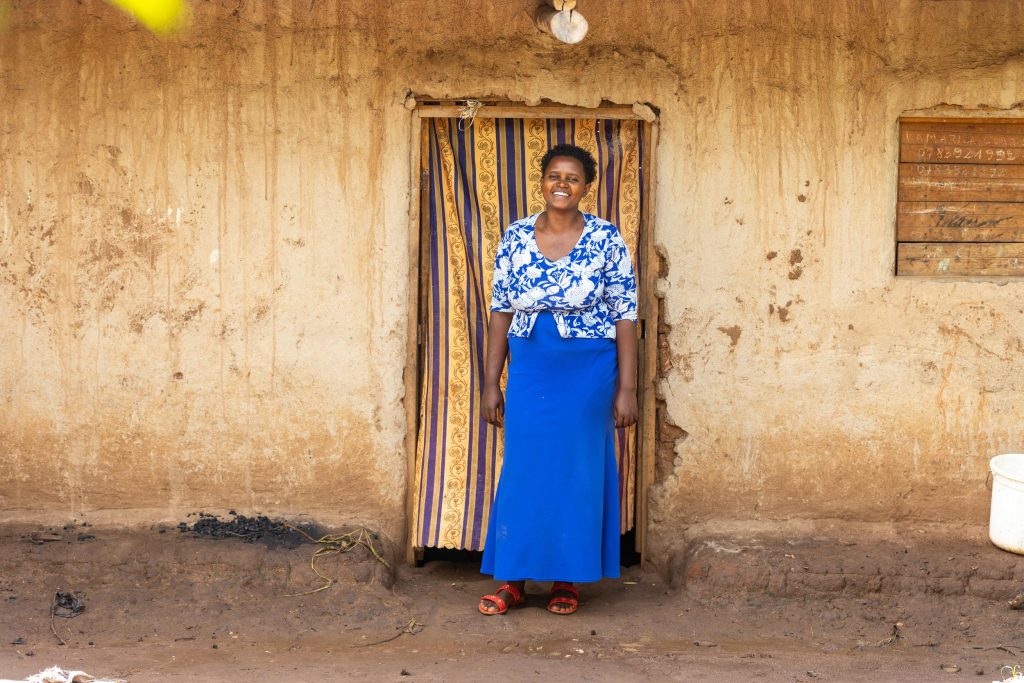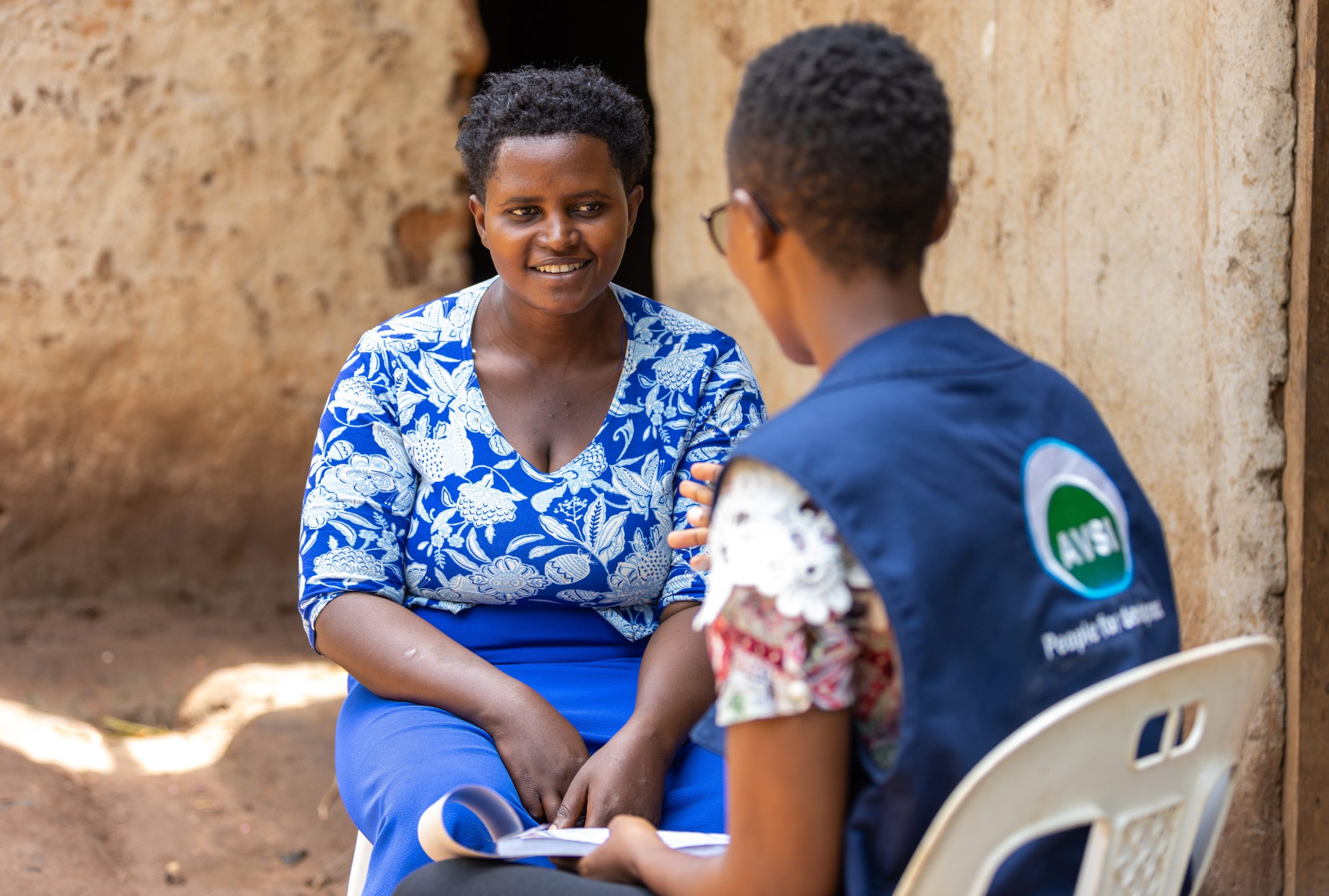Gender-Based Violence is ingrained in the inequality of power between women and men. It dwells in societies where a dominant gender takes advantage of the subordinate status of the other in order to wield authority and supremacy; and it is manifested in diverse forms; physical, verbal, sexual, psychological and economical.
Restricted access to financial resources: the vice that pressured Jackie Mukahigiro’s life
Imagine being restricted access to financial resources or to an income, and being caged in the loop of abuse and constraints of survival – this is the exact spot thirty-two-year-old Jackline Mukahigiro met. Arriving into Uganda from Rwanda in 2002, the mother of five daughters sought refuge in Ndolelire Village, Kyaka II Refugee Settlement. And while in Uganda, Jackline got married and 15 years later in 2022, she separated with her husband. It was at that moment that the husband confiscated Jackline’s refugee family attestation and bank card intended to cater for their monthly cash ratio provided by the World Food Program, stripping her of financial security, credentials and causing loss of their land. Jackline and the children were left in a dilemma.
He locked me and the children in the house and we begged passers-by to open the door. When we left, he took our identifications which he used to receive the cash ratio of UGX 22,000 (Euro 5.13) from the World Food Program without giving us a single penny.
Jackie Mukagiro, beneficiary of the SMILES project.
Malnutrition and irregular schooling: the consequences of gender-based violence on Jackline Mukahigiro's children
The new journey of living with her children was guided by inadequacy of finances to meet their basic needs. With resources deteriorating, the children suffered from malnutrition and their education jeopardized by unpaid fees.
We barely had money for house rent, school fees and food and we ate once a day and my children stopped going to school for a while.
Jackie Mukagiro, beneficiary of the SMILES project.
After relentless yet ineffectual attempts to regain her documents, in April 2023 Jackline resorted to seeking help from the police and local authorities who summoned the accused; but he ignored and did not show collaboration. He continued to stay in control of the cash ratio while providing her subpar amounts of money for three months to keep her quiet.
"Instead of UGX 72,000 (Euro 17.71), he gave me UGX 60,000 (Euro 14.76) from May to July of 2023. I accepted what he gave me because I needed the money to clear the outstanding rent and for other needs. After three months, he stopped sending me any money and then he became unreachable,” says Jackline.
New strides
In July 2023, Jackline’s household was enrolled in the Sustainable Market Inclusive Livelihood Pathways to Self-Reliance (SMILES) project. It was particularly the topic of ‘Basics of Gender’ during the coaching sessions that encouraged her to share her story with the project coach.
“During the coaching sessions, our coach urged any individual with issues of domestic violence to reach out. One of the project interventions is ‘referrals’ – where participants with concerns are referred for help to resolve their issues,” explains Jackline.
Jackline confided in her coach who provided timely assistance after acknowledging the nature of services and agencies necessary. “We provided her a referral form which we completed together and took to the ALIGHT protection desk in Ndolelire Village,” confirms Angelique Nikuze, a SMILES project coach.
The Refugee Welfare Council II was contacted as well in order to confirm Jackline’s story and to accompany her to Intambabiniga Village to receive her November cash ratio. Jackline’s household has since experienced a noteworthy transformation; with regular meals, improved health and well-being and her children's education –with one of them completing their Primary Leaving Examinations at the end of 2023.
“The referral form was legitimate evidence to back the word of mouth by the coach. Due to this referral, I am able to pay my debts, clear school fees for the children and we are having three meals per day,” says Jackline.

Jackline Mukahigiro plans to use half of the cash ratio to boost her grocery stall business where she sells vegetables and other items such as packets of salt, and save up to UGX 20,000 (Euro 4.90) per month in two savings groups. “In the long run, I plan to purchase a plot of land and construct a permanent house from my savings,” forecasts Jackline.
About the SMILES project
The IKEA Foundation-funded Sustainable Market Inclusive Livelihood Pathways to Self-Reliance (SMILES) project targets 14,000 households (corresponding to an estimated 70,000 individuals)—extremely poor refugee and host community households with a woman or youth who is either economically active or can be supported to become economically active.
The five-year (November 2022 to October 2027) programme is being implemented in the rural districts of Kyangwali and the Kyaka II Refugee Settlements in Uganda with the aim of building sustainable livelihoods, self-reliance, and resilience, taking a two-cohort intervention of 24 months each to deliver a graduation model integrated with a market system development approach.




